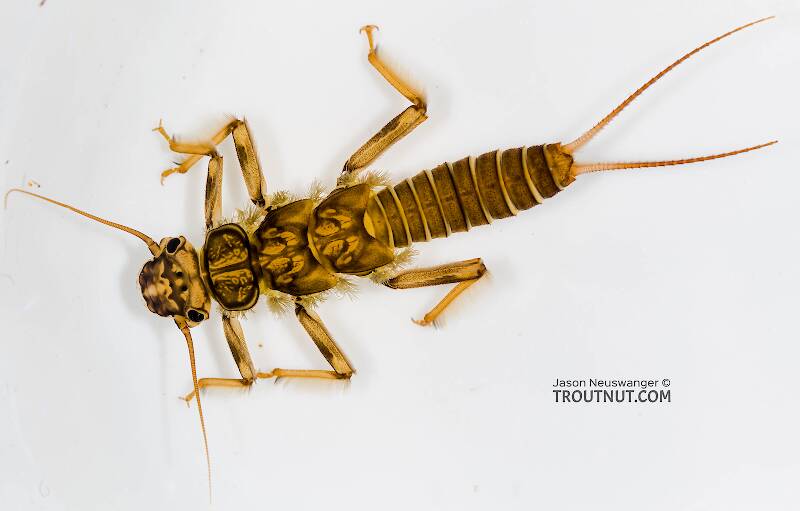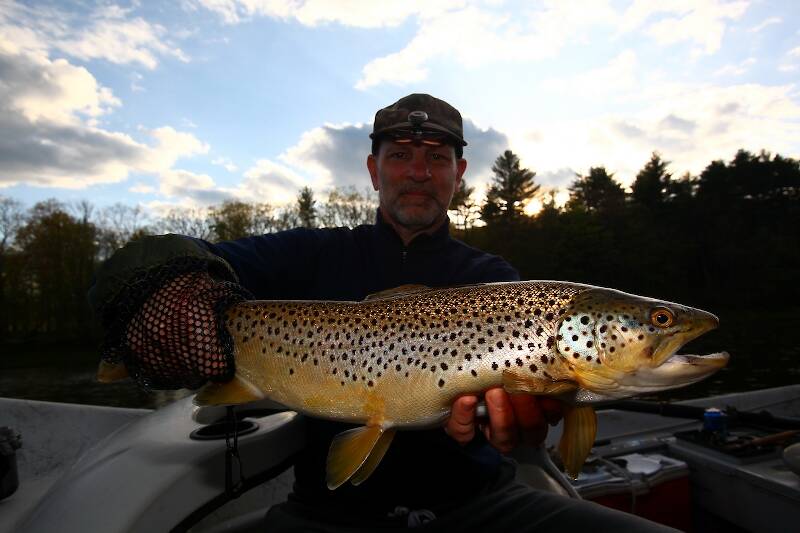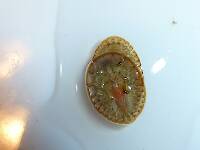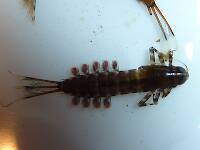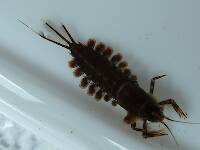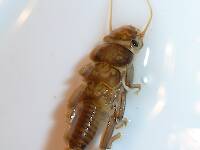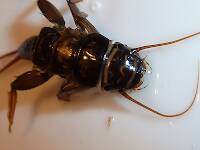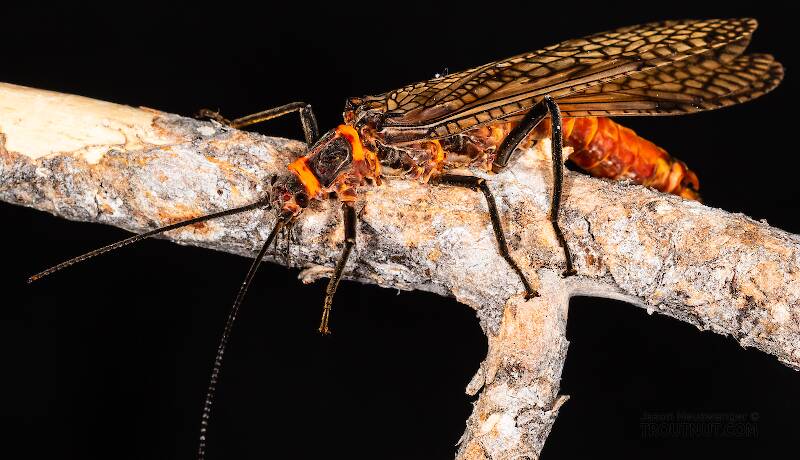
Salmonflies
Pteronarcys californica
The giant Salmonflies of the Western mountains are legendary for their proclivity to elicit consistent dry-fly action and ferocious strikes.
Featured on the forum

Troutnut is a project started in 2003 by salmonid ecologist Jason "Troutnut" Neuswanger to help anglers and
fly tyers unabashedly embrace the entomological side of the sport. Learn more about Troutnut or
support the project for an enhanced experience here.
Martinlf on Feb 23, 2008February 23rd, 2008, 3:06 am EST
Last year Taxon and I had a little debate about the proper way to pronounce Latin, and specifically the word Baetis. Well, I'd like to note to him that I am teaching Latin this semester, and our text Wheelock's Latin provides a pronunciation key for ancient Latin that matches neither his preference as an EE sound, nor mine as an AY sound. Taxon's recommendations last year had led to a suggestion for testing pronunciations on the bugs themselves, and my attempt to follow his suggestion resulted in a striking event while I was fishing, which I shall recount immediately below for those who are new to the forum. But below that I shall note an even stranger event that came as a recent result of learning the proper way to address the ancient Roman Baetis:
WHAT HAPPENED LAST SPRING:
I COMPLAIN TO TAXON THAT THE BAETIS MAYFLIES ARE NOT HATCHING YET AND I WANT TO GO FISHING. HIS REPLY:
MY DESCRIPTION OF THE FIRST FIELD TESTING OF TAXON'S METHOD:
DAVID SHUTS ME DOWN:
AS CONVINCING AS I FOUND DAVID'S ANALYSIS, ON THE FIRST WARM DAY THIS MONTH I WAS COMPELLED TO AGAIN TRY BUG WHISPERING, THIS TIME ARMED WITH WHAT I NOW KNOW IS THE TRUE PRONUNCIATION OF BAETIS.
Under a dull grey sky, with a light misty drizzle falling, I approached the snowy banks with my trusty three weight knowing this would be the day to prove Roger and David wrong, once and for all. I was confident that the correct ancient pronunciation of Baetis, as "BI tis" (the first I pronounced like the i in bite) would bring the bugs to the top and end all this EE AY nonsense. I was fishing a secret hole, far back in the woods, where I never see another fishermen, so I knew I wouldn't be disturbed as I began to whisper, "Here BI tis, here little BI tis." Immediately a cold gust blew down my neck, and an eerie wind made a moaning in the trees. Two intertwined trunks began to creak. Out on the surface of the stream, tiny white wings began to slowly break the surface, and little cream-colored bugs began to assemble. Looking closer I saw that they were wearing full Roman armor!! Soon they had formed a square, opening their wings flat to create a Roman tesudo (in English "turtle") battle formation. That's when the pale silvery trout began to rise and nip at the formation!! They were almost transparent, and I could see their fanned out bones and skull plates as they began to attack the Baetis, who had drawn swords and begun to fend them off. Soon flights of arrows were launched, as the Baetis pulled their shielding wings back and opened paths for the archers beneath to take aim. A small brown, with translucent red spots, took a bundle of arrows in its back, rolled over and sank beneath the surface. At that moment another trout snatched up a whole flank of the tesudo, which was immediately replaced by more hatching ghost bugs. Transfixed, I did not notice the pale man in the white toga standing next to me until he began to untwirl the line on his willow wand and said, with perfect Roman pronunciation, "Nunc Baetis emergunt et pisces emergunt," At that point I did not say a word, either in English or in Latin, but very courteously and rather quickly left the pool to the shadowy angler. I must admit that after this, my days of bug whispering may be at an end.
WHAT HAPPENED LAST SPRING:
I COMPLAIN TO TAXON THAT THE BAETIS MAYFLIES ARE NOT HATCHING YET AND I WANT TO GO FISHING. HIS REPLY:
Gosh, Louis, maybe I can help you out with that one. Once you get properly positioned in the stream, just whisper "Here, BEE tis, here, BEE tis here, here little BEE tis." For several reasons, I recommend doing this quietly, so you won't be overheard, except by the Baetis. Anyway, assuming you already understand the method, it's quite likely they’re not recognizing your pronunciation, and consequently, have no idea you're attempting to call them out. Oh, and don't overdo it, as no one likes being bugged.
The logic behind this phenomena is that, not all nymphs of a given species in the same location achieve maturity at the exact same time, so, many which have reached maturity are simply waiting around for a sufficient number of others to mature, so they will be able to form a proper mating swarm. The point is, the ones already having reached maturity are those, who with bit of gentle coaxing, can sometimes be induced to emerge somewhat earlier than they otherwise would. Of course, this is a total waste of effort when a sufficient number have not already matured, and are growing somewhat impatient. Incidentally, those of us who practice this method of inducement have given to call it "bug whispering.”
MY DESCRIPTION OF THE FIRST FIELD TESTING OF TAXON'S METHOD:
For the Baetids, it was a lovely late winter day, cloudy with just a bit of drizzle. They had been waiting, as we had, through ice and through sleet, for that first day in the 40's. I approached the spring creek shaking with anticipation, as I had practiced Roger's method relentlessly the evening before and was hopeful that it would produce a fishable hatch. The section of stream where I started was well known for early BWO action, and I noticed anglers taking their positions up and downstream from the riffle where I had chosen to start. First I whispered, "Here, BEE tis, here, BEE tis here, here little BEE tis," just as Roger had recommended. No Baetis. I again whispered, "Here, BEE tis, here, BEE tis here, here little BEE tis." No Baetis. I tried it again. No Baetis still. I continued undaunted, for fifty three minutes, whispering "Here, BEE tis, here, BEE tis here, here little BEE tis." No Baetis.
Then I decided that I wasn't calling loudly enough, so just a few decibels louder I called, "Here, BEE tis, here, BEE tis here, here little BEE tis." No Baetis yet. So I raised my voice a bit more, calling, "Here, BEE tis, here, BEE tis here, here little BEE tis." Other anglers started to move away from me, which I thought was not a bad thing, so I called even louder, "Here, BEE tis, here, BEE tis here, here little BEE tis." Anglers moved even farther away. But my calling was, for the ears of the Baetis, to no avail. Finally, after two hours of calling, each time a bit louder, I decided to alter the plan slightly.
I began quietly to call, "Here, BAY tis, here, BAY tis here, here little BAY tis." At the first "BAY" a minute ripple showed just upstream, and a Baetis created a tiny wake as it broke the surface and raised its dun sails. By the time I uttered "tis" forty more were drifting serenely in front of me, and trout had begun to dimple the surface. I called on quietly, and knotted a Gonzo Baetis emerger to my 6X tippet. More bugs and more trout became visible. The other anglers, who had moved away, but not so far that they couldn't see that I had bugs and rising fish, while they didn't, began to draw near, as if attracted by a magnet. Soon they were within earshot, and though I had stopped calling, they had quickly figured out what to do, as they already knew the proper pronunciation. Within fifteen minutes, for a mile and half up and downstream of my position, anglers were softly chanting, "Here, BAY tis, here, BAY tis here, here little BAY tis," and the bugs, oh, Lord, the bugs. They covered the surface of the stream and made it seem a sinuous snake covered with tiny grey scales. They lit on the bare trees and made them seem to be sprouting tiny dun leaves. Eventually they took flight, blotting out the sun, and we all had to pull out our headlamps and flashlights to tie our ligature knots. It was glorious.
Now, what all this means, I won't begin to guess. Taxon and others must draw their own conclusions.
DAVID SHUTS ME DOWN:
I have an explanation for you Louis...
The Bee-tiss were puzzled and perplexed by this odd man mispronouncing their name(Bay-tiss). He was a bit of an oddity, a curiosity, much like the bearded woman at the circus. This is the sort of thing you don't want to look at, but cannot seem to take your eyes off. In regards to why they didn't come out for the Bee-tiss calling, I'm sure they were very worried by such an educated angler. Perhaps he is an entomologist who wants to collect us and throw us in his vials of ETOH, they wondered...
AS CONVINCING AS I FOUND DAVID'S ANALYSIS, ON THE FIRST WARM DAY THIS MONTH I WAS COMPELLED TO AGAIN TRY BUG WHISPERING, THIS TIME ARMED WITH WHAT I NOW KNOW IS THE TRUE PRONUNCIATION OF BAETIS.
Under a dull grey sky, with a light misty drizzle falling, I approached the snowy banks with my trusty three weight knowing this would be the day to prove Roger and David wrong, once and for all. I was confident that the correct ancient pronunciation of Baetis, as "BI tis" (the first I pronounced like the i in bite) would bring the bugs to the top and end all this EE AY nonsense. I was fishing a secret hole, far back in the woods, where I never see another fishermen, so I knew I wouldn't be disturbed as I began to whisper, "Here BI tis, here little BI tis." Immediately a cold gust blew down my neck, and an eerie wind made a moaning in the trees. Two intertwined trunks began to creak. Out on the surface of the stream, tiny white wings began to slowly break the surface, and little cream-colored bugs began to assemble. Looking closer I saw that they were wearing full Roman armor!! Soon they had formed a square, opening their wings flat to create a Roman tesudo (in English "turtle") battle formation. That's when the pale silvery trout began to rise and nip at the formation!! They were almost transparent, and I could see their fanned out bones and skull plates as they began to attack the Baetis, who had drawn swords and begun to fend them off. Soon flights of arrows were launched, as the Baetis pulled their shielding wings back and opened paths for the archers beneath to take aim. A small brown, with translucent red spots, took a bundle of arrows in its back, rolled over and sank beneath the surface. At that moment another trout snatched up a whole flank of the tesudo, which was immediately replaced by more hatching ghost bugs. Transfixed, I did not notice the pale man in the white toga standing next to me until he began to untwirl the line on his willow wand and said, with perfect Roman pronunciation, "Nunc Baetis emergunt et pisces emergunt," At that point I did not say a word, either in English or in Latin, but very courteously and rather quickly left the pool to the shadowy angler. I must admit that after this, my days of bug whispering may be at an end.
"He spread them a yard and a half. 'And every one that got away is this big.'"
--Fred Chappell
--Fred Chappell
Shawnny3 on Feb 23, 2008February 23rd, 2008, 3:15 am EST
Finally a word Southerners pronounce more correctly than Yankees do.
-Shawn
P.S. Nice story, Louis - the imagery was vivid. I could almost hear their little feet marching on the water...
-Shawn
P.S. Nice story, Louis - the imagery was vivid. I could almost hear their little feet marching on the water...
Jewelry-Quality Artistic Salmon Flies, by Shawn Davis
www.davisflydesigns.com
www.davisflydesigns.com
Taxon on Feb 23, 2008February 23rd, 2008, 7:43 am EST
Louis-
When one commits generic names to writing, they are capitalized and italicized, whereas specific names are italicized, but not capitalized. So, it would be Baetis, rather than baetis. One can certainly be forgiven for mispronouncing Latinized epithets, as scholars seem to disagree on ae. However, no controversy exists concerning their proper written form.
Now, please repeat the following (somewhat long-winded) mantra three times in rapid succession:
This was intended as constructive criticism, and does not reflect unfavorably on the high regard I have for the author’s intellect.
When one commits generic names to writing, they are capitalized and italicized, whereas specific names are italicized, but not capitalized. So, it would be Baetis, rather than baetis. One can certainly be forgiven for mispronouncing Latinized epithets, as scholars seem to disagree on ae. However, no controversy exists concerning their proper written form.
Now, please repeat the following (somewhat long-winded) mantra three times in rapid succession:
This was intended as constructive criticism, and does not reflect unfavorably on the high regard I have for the author’s intellect.
Troutnut on Feb 23, 2008February 23rd, 2008, 7:45 am EST
So it's pronounced Bytis?
Suddenly my girlfriend looks less silly for pronouncing it By-ay-tis all the time. At least she had it half right!
Suddenly my girlfriend looks less silly for pronouncing it By-ay-tis all the time. At least she had it half right!
Jason Neuswanger, Ph.D.
Troutnut and salmonid ecologist
Troutnut and salmonid ecologist
Martinlf on Feb 23, 2008February 23rd, 2008, 8:09 am EST
Jason, one will use "BI tis" only if she or he likes a see-through fishing partner, it appears.
And Taxon, I stand corrected. But only you would be cruel enough to let me finish the first installment, wait patiently for the second a year later, then put me to adding all that italics code everywhere throughout both! A dirty trick, no doubt!
And Taxon, I stand corrected. But only you would be cruel enough to let me finish the first installment, wait patiently for the second a year later, then put me to adding all that italics code everywhere throughout both! A dirty trick, no doubt!
"He spread them a yard and a half. 'And every one that got away is this big.'"
--Fred Chappell
--Fred Chappell
Taxon on Feb 23, 2008February 23rd, 2008, 8:28 am EST
A dirty trick, no doubt!
Guilty as charged!
Flybyknight on Feb 23, 2008February 23rd, 2008, 11:29 am EST
Cadat Fortuna Peritas!
Dick
It just occurred to me that I may be charged with haiku
with the above admonishment if it were left to stand alone.
Therefor in order to avoid an unpleasant admonition, let me
expand a bit, or better yet, expound on the dictum; but first let me complement the gentleman with the "Constructive" criticism.
Constructive criticism is good, it is holy and to be appreciated
by the receiver.
The above is the motto of one of the finest institutions that this country has been blessed with; in fact there is a connection to the Golden Rule, with the proviso that the doer do it first.
Now I gave it away, but for the benefit of the youngsters among us,
you-know-what lends dignity to what would otherwise be a vulgar rout.
Dick
Dick
It just occurred to me that I may be charged with haiku
with the above admonishment if it were left to stand alone.
Therefor in order to avoid an unpleasant admonition, let me
expand a bit, or better yet, expound on the dictum; but first let me complement the gentleman with the "Constructive" criticism.
Constructive criticism is good, it is holy and to be appreciated
by the receiver.
The above is the motto of one of the finest institutions that this country has been blessed with; in fact there is a connection to the Golden Rule, with the proviso that the doer do it first.
Now I gave it away, but for the benefit of the youngsters among us,
you-know-what lends dignity to what would otherwise be a vulgar rout.
Dick
Lightly on the dimpling eddy fling;
the hypocritic fly's unruffled wing.
Thomas Scott
the hypocritic fly's unruffled wing.
Thomas Scott
Martinlf on Feb 23, 2008February 23rd, 2008, 1:41 pm EST
Dick, Is that "Cedat Fortuna Peritis"?
"He spread them a yard and a half. 'And every one that got away is this big.'"
--Fred Chappell
--Fred Chappell
Shawnny3 on Feb 24, 2008February 24th, 2008, 12:10 am EST
So, Louis, you nitpick Dick's Latin (or make some subtle Latin joke that no one but the two of you will get - har har), but you won't deign to respond to my Southerner comment - I see how it is.
-Shawn
-Shawn
Jewelry-Quality Artistic Salmon Flies, by Shawn Davis
www.davisflydesigns.com
www.davisflydesigns.com
Martinlf on Feb 24, 2008February 24th, 2008, 1:48 am EST
Shawn, As a child in the South I was taught that there are some things a civilized person just doesn't dignify with a direct response. Sic te exigo.
"He spread them a yard and a half. 'And every one that got away is this big.'"
--Fred Chappell
--Fred Chappell
Shawnny3 on Feb 24, 2008February 24th, 2008, 2:06 am EST
Just trying to drag you down to my level. You're a true Southern gentleman, Louis.
-Shawn
-Shawn
Jewelry-Quality Artistic Salmon Flies, by Shawn Davis
www.davisflydesigns.com
www.davisflydesigns.com
Flybyknight on Feb 24, 2008February 24th, 2008, 10:11 am EST
Louis,
You are correct; TYPO!
Now how do I get my sorry butt, and even sorrier spelling
out of this pickle without getting knocked for the "H" word?
Perhaps we could bring up the Roman centurion treatment of
conquered barbarians, you know the thing about the "yoke" !! Ha Ha.
Dick
You are correct; TYPO!
Now how do I get my sorry butt, and even sorrier spelling
out of this pickle without getting knocked for the "H" word?
Perhaps we could bring up the Roman centurion treatment of
conquered barbarians, you know the thing about the "yoke" !! Ha Ha.
Dick
Lightly on the dimpling eddy fling;
the hypocritic fly's unruffled wing.
Thomas Scott
the hypocritic fly's unruffled wing.
Thomas Scott
Martinlf on Feb 24, 2008February 24th, 2008, 12:23 pm EST
No knocking here, Dick, just good clean fun. Ave atque vale.
"He spread them a yard and a half. 'And every one that got away is this big.'"
--Fred Chappell
--Fred Chappell
Softhackle on Feb 24, 2008February 24th, 2008, 1:26 pm EST
Geeze, guys,
I guess I've been pronouncing it completely wrong, but my Italian interpretation is "bah-ay-tis" I guess the fish just call them a much needed "FOOD". Little olives also works.
Mark
I guess I've been pronouncing it completely wrong, but my Italian interpretation is "bah-ay-tis" I guess the fish just call them a much needed "FOOD". Little olives also works.
Mark
"I have the highest respect for the skilled wet-fly fisherman, as he has mastered an art of very great difficulty." Edward R. Hewitt
Flymphs, Soft-hackles and Spiders: http://www.troutnut.com/libstudio/FS&S/index.html
Flymphs, Soft-hackles and Spiders: http://www.troutnut.com/libstudio/FS&S/index.html
Quick Reply
Related Discussions
Topic
Replies
Last Reply
8
Jan 7, 2009
by Dgracia
by Dgracia
Re: Moser, Grant, and GEM Skues Nephew to accept Fly Fishing Hall of Fame Awards
In General Discussion by Flymom
In General Discussion by Flymom
1
Oct 3, 2009
by JAD
by JAD
Re: One of my favorite Montana views and the Madison River 




In the Photography Board by Wiflyfisher
+ 1





In the Photography Board by Wiflyfisher
16
Jan 7, 2012
by Wiflyfisher
by Wiflyfisher


